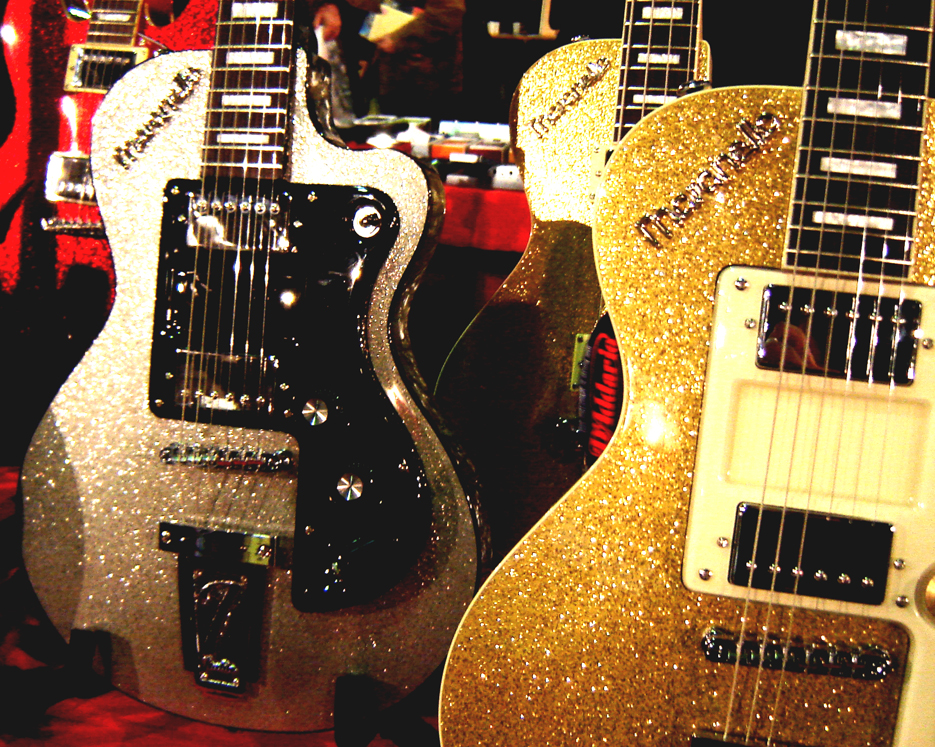There are so many different kinds of guitars. Stratocasters. Telecasters. Dobro. Acoustic. Ovation. 6 string vs. 12 string. And then 7 string came along and 8 string quickly followed. 5 string basses. Spanish, jazz, blues guitars. Some are brands, all are types.
When the rock era hit hard – 1950 and on into the 2000s – guitar sound became de facto in music. It pushed the jazz combo and symphony orchestra off the stages for half a century. Of course, the combos and orchestras survived but no one would say they still dominated stages the way they once had. It wasn’t until the Beatles played Shea Stadium that concerts moved from theater settings into large arenas and stadiums. Ticketron was born.
Rock’s jangly sound was born of guitars. Yet guitars have been around for centuries. But it was Les Paul and his invention of the electric guitar that provided the sound, the groundwork for the rock song. We all remember hearing so many parents saying way back in the 1950s and 1960s, “That’s not music. Now, Tommy Dorsey, Glenn Miller, that was music.” But we know guitars and rock prevailed, for a while at least.
But what a powerful musical intrusion the guitar made! It dominated music. Sure, some rock groups incorporated elements of classical or Big Band music. Groups such as Chicago, Lighthouse, Emerson Lake & Palmer and others brought in trombones, trumpets and/or synthesizers to create a wider variety of sounds as rock artists explored and expanded their craft.
College students would bring their beginner guitars into their dorm rooms and play for themselves or for a small audience. You could find guitar players practicing or performing in the parks or on the city streets. Eventually, even Broadway orchestras began emphasizing guitar sound as the plays themselves often explored a rock ethic (Hair, Jesus Christ Superstar, Godspell). Guitars were shaping the culture. Rock music dominated everything. A lot of Baby Boomers who grew up with it shifted the culture into a hip and attitude-infused ethos.
The concept album and later, the rock opera was born: Sargeant Pepper, Tommy, Quadrophrenia, Ziggy Stardust among others. It grew from there and many will tell you 1969 was better than 1971 or vice versa for being the ultimate year of new releases by major rock artists. Then it began splintering. We didn’t even know it at the time. R&B had been around for years and quickly evolved as rock evolved. Disco came along in the mid 70s and later, punk as did rap and early hip-hop. Rock divided into heavy metal, new wave, prog rock and kept splitting until the grunge movement later took over. (Yes I am skipping many labels here, there are just too many to list).
But the sound, the sound of electric guitars wailing against each other! Sometimes angry and swaggering, other times lamenting and hoping for peace, a reconciliation between lovers or taking a break from it all. Musicians learned to coax these sounds, these widely different emotions from their guitars and this is how the instrument became so ubiquitous. It helps that a foot petal and various electronics help distort the sound into whatever the musician wants. It is a highly flexible instrument because its sound can be so widely modulated.
Most fans don’t care about that. They care about the emotions that result and everyone has their faves. Ask any music fan or party goer for their Top five songs or albums and you will come away with a wide range of opinions. And they won’t be wrong because opinions are never wrong since they are not facts. People’s passions boil over into their opinions and one person’s Gimme Shelter will never agree with another person’s Born to Run.
Now that music has moved on, in the era of the pop artist and synth-oriented bands, guitars are still a part of the ensemble. They are not always as dominant, allowing other musicians to shine. Perhaps it’s about balance. It’s certainly about evolution as everything changes. Artists push the boundaries and if guitars dominate, other artists are going to do something they feel is unique. That’s evolution and artistry rolled into one new style.
And yes, I know there is plenty of guitar-oriented music out there, as if it never left the arena. I recently saw Gary Clark, Jr. for a second time and what an explosion of guitars and metal and soaring solos! Green Day is still getting it done as is Bruce, Neil, Keith and Carlos. Guitars and the wide array of sounds they bring to a band are not going away.
Some day, guitarists might return to dominate again for a new era and then gradually slide off to the edge again as music always and gloriously changes. As much as we might be disappointed to see favorite rock groups age or lose popularity, after a few years, someone else comes along and changes everything and you’re in love again.
A whole new sound comes along and music seems to be reborn.
Chris Ebel
11/9/21
Photo credit: @duchesssa
